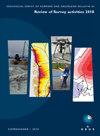The karst and palaeokarst of North and North-East Greenland – physical records of cryptic geological intervals
IF 1.3
4区 地球科学
Q1 GEOLOGY
引用次数: 1
Abstract
Carbonate rocks of Neoproterozoic to Silurian age are abundantly distributed around the coasts of North and North-East Greenland. Palaeokarst horizons are particularly well developed within the Portfjeld Formation (Ediacaran – earliest Cambrian) and beneath the Buen Formation (Cambrian Series 2), and there are caves within Ordovician limestones infilled by Caledonian molasse of Middle Devonian age. The youngest karst is a series of caves distributed from Hall Land in western North Greenland to Kronprins Christian Land in eastern North Greenland. Caves within Ordovician carbonates in Freuchen Land are currently the northernmost documented karst caves globally. The caves are mainly open phreatic conduits, any fill that is present is unlithified, and cave collapse is limited to minor breakdown associated with frost shattering. These geologically young caves are consistently located up to a few 100 m beneath the distinctive plateau that characterises the topography of the northern coast, and their identical context suggests that they developed in a single phase of speleogenesis. The caves are exposed where the plateau has been incised by outlet glaciers from the Greenland ice sheet. The timing of cave development in North Greenland is constrained by the mid- to late-Miocene (15–5 Ma) uplift of the plateau surface and the onset of fjord-forming glaciation in the latest Pliocene – earliest Pleistocene (c. 2.7–2.5 Ma). The evidence suggests that phreatic caves in the southern part of North-East Greenland, on C. H. Ostenfeld Nunatak, are of a broadly similar age. The caves of North and North-East Greenland offer a glimpse of large-scale phreatic drainage systems that developed below an uplifted coastal peneplain during Neogene time. They preserve an important part of the geological history of North and North-East Greenland that is otherwise absent from the physical geological record.格陵兰岛北部和东北部的喀斯特和古喀斯特——神秘地质间隔的物理记录
新元古代至志留纪碳酸盐岩大量分布于格陵兰岛北部和东北部海岸。Portfjeld组(埃迪卡拉纪-最早的寒武纪)和Buen组(寒武纪系列2)下方的古岩溶层特别发育,在中泥盆纪的加里东期磨拉石填充的奥陶系石灰岩中有洞穴。最年轻的喀斯特是一系列洞穴,分布在北格陵兰岛西部的霍尔地到北格陵兰岛东部的克伦平斯基督教地。Freuchen地区奥陶纪碳酸盐岩中的洞穴是目前全球最北端的溶洞。洞穴主要是开放的潜水管道,任何存在的填充物都是未液化的,洞穴坍塌仅限于与霜冻有关的轻微破裂。这些地质上年轻的洞穴一直位于北部海岸独特的高原下几百米处,这些高原是北部海岸地形的特征,它们相同的背景表明它们是在洞穴形成的单一阶段发育起来的。这些洞穴暴露在格陵兰冰盖出口冰川切割的高原上。北格陵兰洞穴发育的时间受到中新世中期至晚期(15-5 Ma)高原表面隆起和最新上新世-最早更新世(约2.7-2.5 Ma)峡湾形成冰川作用的影响。证据表明,格陵兰东北部南部C.H.Ostenfeld Nunatak上的潜水洞穴年龄大致相似。格陵兰岛北部和东北部的洞穴提供了一个新第三纪时期在隆起的海岸准平原下形成的大规模潜水排水系统的一瞥。它们保存了格陵兰岛北部和东北部地质史的重要组成部分,而这在其他方面是物理地质记录中所没有的。
本文章由计算机程序翻译,如有差异,请以英文原文为准。
求助全文
约1分钟内获得全文
求助全文

 求助内容:
求助内容: 应助结果提醒方式:
应助结果提醒方式:


